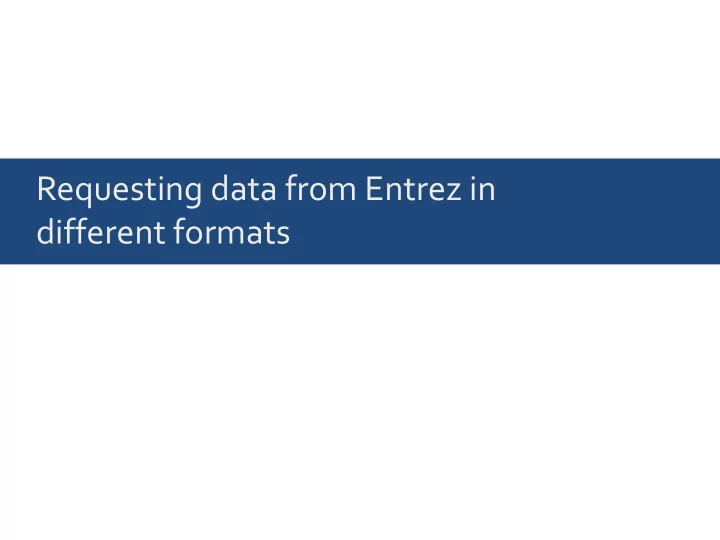

Requesting data from Entrez in different formats
We can request data as text or as XML
We can request data as text or as XML handle = Entrez.efetch(db="nucleotide", id="KT220438", rettype="gb", \ retmode="text") gb_file_contents = handle.read() handle.close() print(gb_file_contents)
We can request data as text or as XML handle = Entrez.efetch(db="nucleotide", id="KT220438", rettype="gb", \ retmode="text") gb_file_contents = handle.read() handle.close() print(gb_file_contents) LOCUS KT220438 1701 bp cRNA linear VRL 20-JUL-2015 DEFINITION Influenza A virus (A/NewJersey/NHRC_93219/2015(H3N2)) segment 4 hemagglutinin (HA) gene, complete cds. ACCESSION KT220438 VERSION KT220438.1 GI:887493048 KEYWORDS . SOURCE Influenza A virus (A/New Jersey/NHRC_93219/2015(H3N2)) ORGANISM Influenza A virus (A/New Jersey/NHRC_93219/2015(H3N2)) Viruses; ssRNA viruses; ssRNA negative-strand viruses; Orthomyxoviridae; Influenzavirus A. REFERENCE 1 (bases 1 to 1701) AUTHORS Sitz,C.R., Thammavong,H.L., Balansay-Ames,M.S., Hawksworth,A.W.,
We can request data as text or as XML handle = Entrez.efetch(db="nucleotide", id="KT220438", rettype="gb", \ retmode="xml") gb_file_contents = handle.read() handle.close() print(gb_file_contents) <?xml version="1.0" ?> <!DOCTYPE GBSet PUBLIC "-//NCBI//NCBI GBSeq/EN" "https://www.ncbi.nlm.nih.gov/dtd/NCBI_GBSeq.dtd"> <GBSet> <GBSeq> <GBSeq_locus>KT220438</GBSeq_locus> <GBSeq_length>1701</GBSeq_length> <GBSeq_strandedness>single</GBSeq_strandedness> <GBSeq_moltype>cRNA</GBSeq_moltype> <GBSeq_topology>linear</GBSeq_topology> <GBSeq_division>VRL</GBSeq_division> <GBSeq_update-date>20-JUL-2015</GBSeq_update-date> <GBSeq_create-date>20-JUL-2015</GBSeq_create-date> <GBSeq_definition>Influenza A virus (A/NewJersey/NHRC_93219/2015(H3N2))
Pros and cons of text and XML Text: • Easier to read for humans • Requires special parser for each datatype XML: • Very hard to read for humans • Can be parsed with a generic parser
We parse text format with SeqIO.read() handle = Entrez.efetch(db="nucleotide", id="KT220438", rettype="gb", \ retmode="text") record = SeqIO.read(in_handle, format="gb") # use SeqIO.read() to parse handle.close()
We parse text format with SeqIO.read() handle = Entrez.efetch(db="nucleotide", id="KT220438", rettype="gb", \ retmode="text") record = SeqIO.read(in_handle, format="gb") # use SeqIO.read() to parse handle.close() print(record) ID: KT220438.1 Name: KT220438 Description: Influenza A virus (A/NewJersey/NHRC_93219/2015(H3N2)) segment 4 hemagglutinin (HA) gene, complete cds. Number of features: 5 /data_file_division=VRL /date=20-JUL-2015 /accessions=['KT220438'] /sequence_version=1 /keywords=[''] /source=Influenza A virus (A/New Jersey/NHRC_93219/2015(H3N2)) /organism=Influenza A virus (A/New Jersey/NHRC_93219/2015(H3N2)) /taxonomy=['Viruses', 'ssRNA viruses', 'ssRNA negative-strand viruses', 'Orthomyxoviridae', 'Influenzavirus A'] /references=[Reference(title='GEISS Influenza Surveillance Response Program', ...), Reference(title='Direct Submission', ...)] /structured_comment=defaultdict(<class 'dict'>, {'Assembly-Data': {'Sequencing
We parse XML format with Entrez.parse() handle = Entrez.efetch(db="nucleotide", id="KT220438", rettype="gb", \ retmode="xml") parsed = Entrez.parse(in_handle) # use Entrez.parse() to parse record = list(parsed)[0] # Need to convert into list and get 1 st element handle.close()
We parse XML format with Entrez.parse() handle = Entrez.efetch(db="nucleotide", id="KT220438", rettype="gb", \ retmode="xml") parsed = Entrez.parse(in_handle) # use Entrez.parse() to parse record = list(parsed)[0] # Need to convert into list and get 1 st element handle.close() print(record) # Record contains nested dictionaries and lists {'GBSeq_locus': 'KT220438', 'GBSeq_length': '1701', 'GBSeq_strandedness': 'single', 'GBSeq_moltype': 'cRNA', 'GBSeq_topology': 'linear', 'GBSeq_division': 'VRL', 'GBSeq_update-date': '20-JUL-2015', 'GBSeq_create- date': '20-JUL-2015', 'GBSeq_definition': 'Influenza A virus (A/NewJersey/NHRC_93219/2015(H3N2)) segment 4 hemagglutinin (HA) gene, complete cds', 'GBSeq_primary-accession': 'KT220438', 'GBSeq_accession-version': 'KT220438.1', 'GBSeq_other-seqids': ['gb|KT220438.1|', 'gi|887493048'], 'GBSeq_source': 'Influenza A virus (A/New Jersey/NHRC_93219/2015(H3N2))', 'GBSeq_organism': 'Influenza A virus (A/New Jersey/NHRC_93219/2015(H3N2))', 'GBSeq_taxonomy': 'Viruses; ssRNA viruses; ssRNA negative-strand viruses; Orthomyxoviridae; Influenzavirus A', 'GBSeq_references': [{'GBReference_reference': '1', 'GBReference_position': '1..1701', 'GBReference_authors': ['Sitz,C.R.', 'Thammavong,H.L.', 'Balansay-Ames,M.S.', 'Hawksworth,A.W.', 'Myers,C.A.', 'Brice,G.T.'], 'GBReference_title': 'GEISS Influenza Surveillance Response Program', 'GBReference_journal': 'Unpublished'}, {'GBReference_reference': '2', 'GBReference_position':
All information from parsed XML format can be accessed using dict & list methods # extract all the features features = record['GBSeq_feature-table'] # print feature key & location for all features for feature in features: print(feature['GBFeature_key'] + ": " + \ feature['GBFeature_location']) source: 1..1701 gene: 1..1701 CDS: 1..1701 mat_peptide: 49..1035 mat_peptide: 1036..1698
All information from parsed XML format can be accessed using dict & list methods # extract all the features features = record['GBSeq_feature-table'] # print feature key & location for all features for feature in features: print(feature['GBFeature_key'] + ": " + \ feature['GBFeature_location']) source: 1..1701 gene: 1..1701 CDS: 1..1701 mat_peptide: 49..1035 mat_peptide: 1036..1698
All information from parsed XML format can be accessed using dict & list methods # extract all the features features = record['GBSeq_feature-table'] # print feature key & location for all features for feature in features: print(feature['GBFeature_key'] + ": " + \ feature['GBFeature_location']) source: 1..1701 gene: 1..1701 CDS: 1..1701 mat_peptide: 49..1035 mat_peptide: 1036..1698
Running searches through Entrez
Example: Literature search using pubmed
Example: Literature search using pubmed handle = Entrez.esearch(db="pubmed", # database to search term="Wilke CO", # search term retmax=5) # max. number of results record = Entrez.read(handle) handle.close() # search returns PubMed IDs (pmids) pmid_list = record["IdList"] print(pmid_list) ['28301766', '28228542', '27834632', '27713835', '27535929']
We retrieve search results with efetch() # For references, the file format is called "Medline" from Bio import Medline handle = Entrez.efetch(db="pubmed", id=pmid_list, rettype="medline", retmode="text") records = Medline.parse(handle) # Must not close handle yet! for record in records: print(record['AU']) # author list print(record['TI']) # title print(record['SO']) # source (reference) print() handle.close() # Close after all records have been processed
We retrieve search results with efetch() ['Echave J', 'Wilke CO'] Biophysical Models of Protein Evolution: Understanding the Patterns of Evolutionary Sequence Divergence. Annu Rev Biophys. 2017 Mar 15. doi: 10.1146/annurev-biophys-070816-033819. ['Teufel AI', 'Wilke CO'] Accelerated simulation of evolutionary trajectories in origin-fixation models. J R Soc Interface. 2017 Feb;14(127). pii: 20160906. doi: 10.1098/rsif.2016.0906. ['Lipsitch M', 'Barclay W', 'Raman R', 'Russell CJ', 'Belser JA', 'Cobey S', 'Kasson PM', 'Lloyd-Smith JO', 'Maurer-Stroh S', 'Riley S', 'Beauchemin CA', 'Bedford T', 'Friedrich TC', 'Handel A', 'Herfst S', 'Murcia PR', 'Roche B', 'Wilke CO', 'Russell CA'] Viral factors in influenza pandemic risk assessment. Elife. 2016 Nov 11;5. pii: e18491. doi: 10.7554/eLife.18491. ['McWhite CD', 'Meyer AG', 'Wilke CO'] Sequence amplification via cell passaging creates spurious signals of positive adaptation in influenza virus H3N2 hemagglutinin. Virus Evol. 2016 Jul;2(2). pii: vew026. Epub 2016 Oct 3. ['Spielman SJ', 'Wan S', 'Wilke CO'] A Comparison of One-Rate and Two-Rate Inference Frameworks for Site-Specific dN/dS Estimation. Genetics. 2016 Oct;204(2):499-511. Epub 2016 Aug 17.
Recommend
More recommend